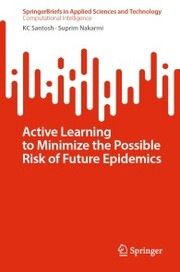-
Zusatztext
-
<p>Future epidemics are inevitable, and it takes months and even years to collect fully annotated data. The sheer magnitude of data required for machine learning algorithms, spanning both shallow and deep structures, raises a fundamental question: how big data is big enough to effectively tackle future epidemics? In this context, active learning, often referred to as human or expert-in-the-loop learning, becomes imperative, enabling machines to commence learning from day one with minimal labeled data. In unsupervised learning, the focus shifts toward constructing advanced machine learning models like deep structured networks that autonomously learn over time, with human or expert intervention only when errors occur and for limited dataa process we term mentoring. In the context of Covid-19, this book explores the use of deep features to classify data into two clusters (0/1: Covid-19/non-Covid-19) across three distinct datasets: cough sound, Computed Tomography (CT) scan, and chest x-ray (CXR). Not to be confused, our primary objective is to provide a strong assertion on how active learning could potentially be used to predict disease from any upcoming epidemics. Upon request (education/training purpose), GitHub source codes are provided.<br></p>
-
-
Autorenportrait
- <p>Prof.<b>KC Santosh</b>, a highly accomplished AI expert, is the chair of the Department of Computer Science, University of South Dakota. He served the National Institutes of Health as a research fellow. Before that, he worked as a postdoctoral research scientist at the LORIA research centre, Universitè de Lorraine in direct collaboration with industrial partner, ITESOFT, France. He earned his PhD in Computer Science - Artificial Intelligence from INRIA Nancy Grand East Research Centre (France). With funding of over $1.3 million, including a $1 million grant from DEPSCOR (2023) for AI/ML capacity building at USD, he has authored 10 books and published over 240 peer-reviewed research articles. He is an associate editor of multiple prestigious journals such as IEEE Transactions on AI, Int. J of Machine Learning& Cybernetics, and Int. J of Pattern Recognition& Artificial Intelligence. To name a few, Prof. Santosh is the proud recipient of the Cutler Award for Teaching and Research Excellence (USD, 2021), the President's Research Excellence Award (USD, 2019) and the Ignite Award from the U.S. Department of Health& Human Services (HHS, 2014). As the founder of AI programs at USD, he has taken significant strides to increase enrolment in the graduate program, resulting in over 3,000% growth in just three years. His leadership has helped build multiple inter-disciplinary AI/Data Science related academic programs, including collaborations with Biology, Physics, Biomedical Engineering, Sustainability and Business Analytics departments. Prof. Santosh is highly motivated in academic leadership, and his contributions have established USD as a pioneer in AI programs within the state of SD. More info. https://kc-santosh.org/. </p><p>Mr.<b>Suprim Nakarmi</b>is a research fellow for the Applied AI research lab, Department of Computer Science at the University of South Dakota. His research focuses on active learning, specifically addressing the pressing global issue of future epidemics.</p><br><p></p>
Detailansicht
Active Learning to Minimize the Possible Risk of Future Epidemics
eBook - SpringerBriefs in Applied Sciences and Technology
ISBN/EAN: 9789819974429
Umbreit-Nr.: 1632860
Sprache:
Englisch
Umfang: 0 S., 2.92 MB
Format in cm:
Einband:
Keine Angabe
Erschienen am 22.11.2023
Auflage: 1/2023
E-Book
Format: PDF
DRM: Digitales Wasserzeichen


